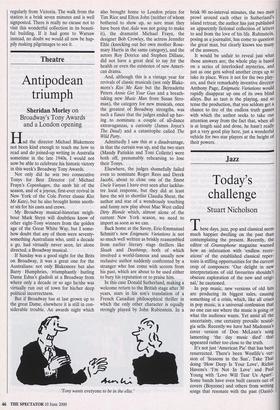Theatre
Antipodean triumph
Sheridan Morley on Broadway's Tony Awards and a London opening Had the director Michael Blakemore not been kind enough to teach me how to read and do joined-up writing in Australia sometime in the late 1940s, I would not now be able to celebrate his historic victory in this week's Broadway Tony Awards.
Not only did he win two consecutive Tonys for Best Director (of Michael Frayn's Copenhagen, the snob hit of the season, and of a joyous, first-ever revival in New York of the Cole Porter classic Kiss Me Kate), but he also brought home anoth- er six for his casts and crews.
My Broadway musical-historian neigh- bour Mark Steyn will doubtless know of other eight-Tony winners from the golden age of the Great White Way, but I some- how doubt that any of them were seventy- something Australians who, until a decade a go, had virtually never seen, let alone directed, a Broadway musical.
If Sunday was a good night for the Brits on Broadway, it was a great one for the Australians: not only Blakemore but also Barry Humphries, triumphantly hurling Dame Edna's gladioli at a Broadway from where only a decade or so ago he/she was virtually run out of town for his/her deep political incorrectness.
But if Broadway has at last grown up to the great Dame, elsewhere it is still in con- siderable trouble. An awards night which also brought home to London prizes for Tim Rice and Elton John (neither of whom bothered to show up, so sure must they have been that Aida was not going to make it), the dramatist Michael Frayn, the designer Bob Crowley, the actress Jennifer Ehle (knocking out her own mother Rose- mary Harris in the same category), and the actors Roy Dotrice and Stephen Dillane, did not have a great deal to say for the health or even the existence of new Ameri- can drama.
And, although this is a vintage year for revivals of classic musicals (not only Blake- more's Kiss Me Kate but the Bernadette Peters Annie Get Your Gun and a breath- taking new Music Man from Susan Stro- man), the category for new musicals, once the greatest of Broadway strengths, was such a fiasco that the judges ended up hav- ing to nominate a couple of all-dance extravaganzas, a curiosity (James Joyce's The Dead) and a catastrophe called The Wild Party.
Admittedly I saw this at a disadvantage, in that the curtain was up, and the two stars (Mandy Patinkin and Toni Collette) were both off, presumably rehearsing to lose their Tonys.
Elsewhere, the judges shamefully failed even to nominate Roger Rees and Derek Jacobi, about to close one of the finest Uncle Vanyas I have ever seen after lacklus- tre local response, but they did at least have the wit to shortlist Claudia Shear, the author and star of a wondrously touching and funny new play about Mae West called Dirty Blonde which, almost alone of the current New York season, we need to import as soon as we can.
Back home at the Savoy, Eric-Emmanuel Schmitt's new Enigmatic Variations is not so much well written as briskly reassembled from earlier literary stage thrillers like Sleuth and Deathtrap, both of which involved a world-famous and usually now reclusive author suddenly confronted by a stranger who has come with secrets from his past, which are about to be used either to bury his reputation or to praise him.
In this case Donald Sutherland, making a welcome return to the British stage after 30 years, stars in his son's translation of a French Canadian philosophical thriller in which the only other character is equally strongly played by John Rubinstein. In a `Tony wants everyone to be in the elite.' brisk 90 no-interval minutes, the two men prowl around each other in Sutherland's island retreat; the author has just published an apparently fictional collection of letters to and from the love of his life. Rubinstein, posing as a journalist, has come to question the great man, but clearly knows too many of the answers.
It would be unfair to reveal just what those answers are; the whole play is based on a series of interlocked mysteries, and just as one gets solved another crops up to take its place. Were it not for the two play- ers, and their remarkably inventive director Anthony Page, Enigmatic Variations would rapidly disappear up one of its own blind alleys. But so taut is the playing, and so tense the production, that you seldom get a chance to tire of the endless truth games with which the author seeks to take our attention away from the fact that, when all is at length said and done, he hasn't really got a very good play here, just a wonderful vehicle for two star players at the height of their powers.
































































 Previous page
Previous page